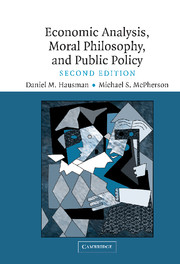I - RATIONALITY AND MORALITY
Published online by Cambridge University Press: 06 July 2010
Summary
When we say that it is morally right to relieve famine victims, we are expressing our approval of famine relief and we are at least suggesting that people ought to come to the aid of those in danger of starvation. Morality is both expressive and normative as opposed to merely descriptive.
So is rationality. When we say that it is rational for individuals to have medical insurance, we are expressing approval of doing so and suggesting that people ought to make sure they are insured. Similarly, to characterize a choice as irrational is usually to condemn it, and not simply to describe it.
Not only are morality and rationality alike in these ways, but “rational” is often used (as in the previous example) as a synonym for “prudent,” and prudence is a morally admirable character trait or moral virtue. Yet morality and rationality are of course not the same thing.
How are morality and rationality related? Is it always rational to be moral? These general philosophical questions are critical to understanding the relations between ethics and economics, because economics is built around a theory of rationality. We explore the relations between economics and rationality in Chapter 5 and between rationality, norms, and morality in Chapter 6.
But first, Chapter 4 presents the standard theory of rationality and its extensions to circumstances of risk and uncertainty; it also considers some of the objections to which the theory has been subject.
- Type
- Chapter
- Information
- Economic Analysis, Moral Philosophy and Public Policy , pp. 43 - 44Publisher: Cambridge University PressPrint publication year: 2006



